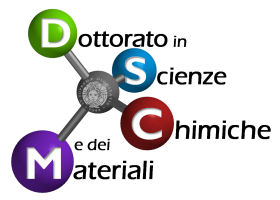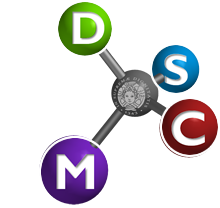
The Doctoral School in Chemistry and Material Science (DSCM) is located at the Department of Chemistry and Industrial Chemistry (Dipartimento di Chimica e Chimica Industriale - DCCI) of the University of Pisa.
The DSCM aims to prepare young master students in the most modern and innovative fields of Chemistry. Besides traditional subjects, as Analytical, Physical, Inorganic, Organic and Industrial Chemistry, interdisciplinary research projects on Biotechnologies and Materials Sciences are proposed. To this end, the students have access both to top-level education and to a network of collaborations within the academic and industrial worlds.
1. Description of the Training Project
The training project of the Doctoral School in Chemistry and Material Science (DSCM) encompasses the following aspects: 1. The deepening of knowledge in theoretical, experimental, and computational techniques and methodologies for the synthesis, characterization, and development of molecular systems and materials; 2. The enhancement of the capacity to conduct independent research while simultaneously integrating into a highly interdisciplinary local and international research network; 3. The acquisition of cross-disciplinary skills, including the ability to rigorously and effectively present one's research work to both specialized and broader audiences, to prepare research proposals, write scientific publications, and incorporate them into an extensive document, such as the final thesis.
This training project is subject to annual updates through consultations with stakeholders, taking into account the characteristics of the incoming cultural profiles and the outgoing professional profiles.
The Board of Professors designates a supervisor and a co-supervisor for each doctoral student, typically selected from the Board itself or among the faculty and researchers of the DCCI. The co-supervisor may also belong to the scientifically qualified personnel of other public and private universities or research institutions. The doctoral student develops, with the aid of the supervisor and co-supervisor, a research project, which is then presented to the Board. The specific plan for each doctoral student's educational activities is also agreed upon with the supervisor, co-supervisor, and the Coordinator of the Doctoral School. They, with the assistance of the Board, continually monitor the scientific and educational activities, assess annual reports, intermediate seminars, and guide the student in setting and achieving objectives, fostering increasing levels of autonomy.
Doctoral candidates are required to complete two or more courses offered by the DSCM (https://dscm.dcci.unipi.it/courses-seminars/courses.html) during the first year, totaling a minimum of 32 hours, and at least 28 hours over the second and third years, structured so as not to hinder research activities. Subject to the Board's approval, one or more of these courses can be substituted with courses organized by the University of Pisa, other Doctoral schools, or national and international summer/winter-schools.
The project includes elements of advanced linguistic proficiency, and all educational activities are conducted in English, the official language of the doctoral program. Doctoral candidates are encouraged to participate in the course “English for Research Publication and Presentation Purposes” (30 hours) organized by the University's “Centro Linguistico”, as well as modules from cross-disciplinary educational activities organized by the University of Pisa (https://dottorato.unipi.it/index.php/en/), and a minimum number of scientific seminars organized by the DSCM, the Department of Chemistry and Industrial Chemistry (DCCI), other University departments at Pisa, local research institutions, or national and international schools.
Additionally, students are involved in scientific outreach activities. Second-year students are responsible for organizing the international conference “Chemistry For the Future” (https://cff.dcci.unipi.it/). Throughout the program, students are encouraged to participate in national and international conferences and workshops, engage in science outreach activities such as “Bright – European Researchers' Night”, and contribute to the creation of informative videos related to their research activities, known as “PhD Tales” (https://dscm.dcci.unipi.it/phd-students/video-phd.html).
Specifically, the University of Pisa's cross-disciplinary educational offering includes courses designed to enhance knowledge, skills, and competencies in linguistic, statistical, digital, and entrepreneurial areas, with the aim of improving employability and professional growth, as well as familiarity with international research systems and results dissemination. The University also offers action-learning seminars under the Career Labs for Doc platform and for European project design. Particular attention is paid to the visibility of the training and research project: all doctoral candidates are required to communicate their primary research results to a non-specialist audience through a dedicated "PhD Showcase" and the DSCM channels (https://dscm.dcci.unipi.it/phd-students/phd-showcase.html), and to update their personal web pages containing information on research projects and products such as scientific publications and contributions to conferences (example: https://dscm.dcci.unipi.it/phd-students/active-cycles.html). Furthermore, students are encouraged to participate in scientific events and competitive calls at the local, national, and international levels, engaging in activities designed to deepen the interdisciplinary aspects of their research and develop the skills needed to respond to competitive calls and manage various aspects of a scientific research project. Each year, students are required to present a progress report on their research to the Board of Professors of the DSCM and all faculty members of the DCCI, along with a seminar.
2. Course Objectives
The Doctorate in Chemical Sciences and Materials (DSCM) aims to provide comprehensive training for young graduates in Chemistry, Industrial Chemistry, and related disciplines in the most advanced research methodologies across various fields within Chemistry and Materials Science. It equips them with the necessary knowledge to assume significant roles in the field of chemistry as both a fundamental and applied science, industrial chemistry, material science, and other sectors where chemistry plays a predominant role.
Doctoral candidates learn how to address and resolve complex problems through the competent use of experimental, computational, and theoretical techniques in a multidisciplinary research environment. This encompasses aspects of synthesis, characterization, and the development of molecular species, organic and inorganic materials, polymers, and supramolecular structures.
Within a highly qualified context, each doctoral student acquires the skills, capabilities, and research methodologies to engage in high-level scientific research. This includes developing their own research project in one of the most modern and advanced fields of chemistry, such as molecular modeling, the synthesis and characterization of molecular systems and aggregates, polymeric and/or hybrid functional and nanostructured materials, spectroscopic and thermodynamic study of molecular and complex systems properties, phenomena related to energy production, storage, and transport, innovative methodologies for environmental, clinical, and cultural heritage analysis, reaction mechanisms, and processes of interaction between molecules, catalysis, and sustainable chemical processes for the more efficient utilization of environmental and natural resources. Multidisciplinary research is actively encouraged, involving various scientific disciplines and collaborations with other university departments and research institutions, both national and international.
The achievement of research objectives is facilitated by the access provided to doctoral students to high-level favilities, including instrumentation, services, logistical and administrative support, departmental infrastructure, university libraries and bibliographic resources, the Sistema Informatico di Ateneo, and the Centre for Instrument Sharing of the University of Pisa (CISUP - https://cisup.unipi.it/). CISUP serves as a core facility platform offering access to a wide range of state-of-the-art equipment, including advanced mass spectrometry techniques, microscopy and imaging, materials analysis, calorimetry, spectroscopy, and additive manufacturing and microlayering techniques, among others.
The achievement of the course's objectives heavily depends on the extensive and diverse scientific and technical support provided by the professors, technical staff, and collaborators of the DCCI. They share a clear, well-structured, and public vision of the doctoral training path.
Another objective is the internationalization of the educational environment, which is pursued by promoting extensive contacts for doctoral students with internationally renowned researchers and research institutions, including international projects, scientific events, and specially organized teaching activities, partially led by high-profile foreign scholars and experts invited by the DSCM. To this end, doctoral students are strongly encouraged to undertake periods of mobility abroad lasting between 3 and 12 months. The purpose is to provide students with the ability to conduct research activities in international and dynamic settings, promoting their independence and integrating them into highly qualified international collaboration networks.
In addition to scientific training, the educational project of the course (as detailed in the preceding section) also focuses on the development of cross-disciplinary skills and soft skills. These include teamwork, scientific communication, outreach activities, event organization, participation in competitive calls, knowledge of European and international research systems, and research project management.
The objectives of the DSCM also include training doctoral students to actively engage in the third mission. To achieve this, specific activities are designed, and students are involved in communication and outreach initiatives at various stages of their research activities, tailored to specific audiences and diversified targets. Contacts with industries and collaborations with private companies and public institutions are also established, as they often play a significant role in the students' projects. Technology transfer and results valorization objectives are consistently supported by the Department and the University. This maximizes the impact of the students' research and places them at the center of a network of cross-sector contacts that significantly enhance their professional and career prospects after completing their doctoral studies.
3. Expected employment and professional opportunities
Upon completion of the doctoral program, the highly qualified graduates will be conferred with the title of PhD in Chemistry and Material Science. They will possess the capability to undertake research, management, and coordination roles of paramount importance across various domains encompassing chemistry, industrial chemistry, environmental science, and materials science. These roles extend to public and private research institutions, private companies, and the public administration.
The principal anticipated employment and professional prospects for Doctor of Research in Chemical Sciences and Materials include:
• Pursue of an academic and research career at Italian and international universities and research institutions;
• Employment in companies and public organizations engaged in education and research;
• Employment in companies and public entities operating in quality control, environmental monitoring and analysis, as well as the preservation and protection of cultural heritage;
• Employment in private enterprises operating in the fields of chemistry, energy, manufacturing, environmental sustainability, technological innovation, and materials;
• Independent practice in the field of chemistry.
According to the latest surveys conducted by the inter-university consortium AlmaLaurea for the 32nd doctoral cycle, one year after obtaining their degree, the employment rate of respondents stands at 100% for both women and men, with an average salary of approximately €1500. These statistics underline that the DSCM at the University of Pisa ensures the education of highly qualified professionals who can quickly and effectively integrate into the workforce across various professional domains.
Several factors contribute to the added value of the education provided by the DSCM for future career prospects. Doctoral thesis supervisors and other faculty members of the Department of Chemistry and Industrial Chemistry maintain direct collaborations with local, national, and international companies. This has, among other things, led to the funding of 7 scholarships for the 37th cycle under the PON 2014-2020 (DM 1061/2021), specifically related to the IV.5 action - Doctorates on green topics, in collaboration with as many companies (6 national and 1 European). In the 37th cycle, an Industrial Doctorate program was also launched in collaboration with the company G.E.S. in Povo (TN). In the 38th Cycle, 8 scholarships are active, financed through PNRR projects, including 4 scholarships under DM352 grant scheme, co-financed by companies.
In recent cycles, several students have conducted their research projects at the Fondazione Pisana per la Scienza (Pisa Science Foundation) or in collaboration with the Pisa University Hospital. Two former students from the 34th cycle are now partners in the innovative start-up Metitech srl.
Throughout the doctoral program, special attention is given to connecting students to a network of cross-sector research contacts and collaborations at the international and national levels. This significantly enhances their professional and career prospects after obtaining their degree.
Lastly, the doctoral program's educational path (see the relevant section) places particular emphasis on the development of soft skills and engagement in the third mission. This is achieved through dedicated activities and cross-disciplinary initiatives organized by the University of Pisa, covering areas such as research valorization, innovation, and entrepreneurial culture.

